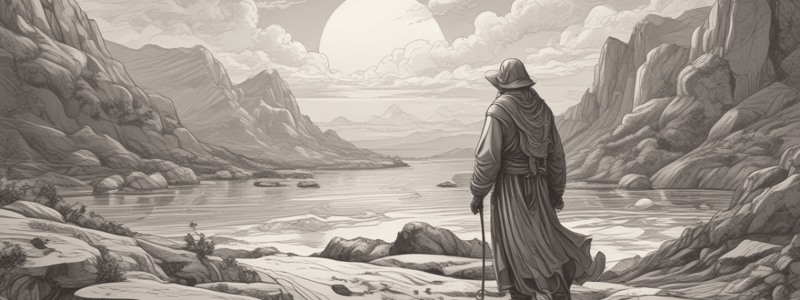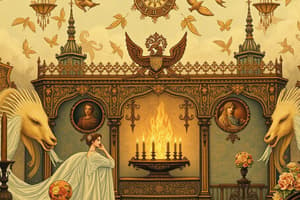Podcast
Questions and Answers
What is a characteristic of a flat character?
What is a characteristic of a flat character?
- They are always the protagonist of the story.
- They are well-developed and have many traits.
- They can be easily defined in a single sentence. (correct)
- They undergo a significant change in personality throughout the story.
What is the main difference between a dynamic character and a round character?
What is the main difference between a dynamic character and a round character?
- A dynamic character is one that changes, while a round character is one that is complex. (correct)
- A dynamic character is one that is simple, while a round character is one that is one-dimensional.
- A dynamic character is one that is complex, while a round character is one that is simple.
- A dynamic character is one that changes, while a round character is one that does not change.
What is a characteristic of a static character?
What is a characteristic of a static character?
- They undergo a significant change in personality throughout the story.
- They are always the antagonist of the story.
- They remain the same throughout the story. (correct)
- They are well-developed and have many traits.
What is the term for a character that is instantly recognizable because of a stereotype?
What is the term for a character that is instantly recognizable because of a stereotype?
What can be said about minor characters in a story?
What can be said about minor characters in a story?
Flashcards are hidden until you start studying
Study Notes
Character and Characterization
- A character is a person, animal, or imaginary creature that takes part in the action of a literary work, while characterization is all the techniques a writer uses to create and develop a character.
Elements of Characterization
- Physical Appearance: What does the character look like?
- Actions, Speech, and Behaviour: What does the character do? How does the character behave? What does the character say?
- Interactions with Others: How other characters in the story react to this character?
Types of Characterization
- Direct or Explicit Characterization: Uses another character, narrator, or protagonist to tell the readers or audience about the subject.
- Indirect or Implicit Characterization: A more subtle way of introducing the character to the audience, where the audience has to deduce the characteristics of the character based on their thoughts, behavior, speech, and interactions.
Classification of Characters
- According to Function:
- Protagonist: Central character, pushes the action forward, and is usually seen as a good person or hero/heroine.
- Antagonist: Opposes the protagonist, holds the action back, and is usually seen as a bad person/force or villain.
- Confidant/e: Friend or relative of the hero/ine, present when the hero needs a sympathetic listener to confide in.
- Foil: Secondary or minor character, contrast or opposite to the protagonist, emphasizing or highlighting their traits.
Classification of Characters (Cont.)
- According to Development:
- Dynamic/Round: Well-developed, many traits (good and bad), realistic, and life-like.
- Static/Flat: Not well-developed, lacks many traits, easily defined in a single sentence.
- Anti-hero/Anti-heroine: Lacks typical heroic qualities, such as bravery, courage, and morality.
Character Types
- Round: Well-developed, many traits, realistic, and life-like.
- Flat: Not well-developed, lacks many traits, easily defined in a single sentence.
- Dynamic: Undergoes an important change in personality in the story.
- Static: Remains the same throughout the story.
- Stocked/Stereotyped: Based on clichés and social prejudices, instantly recognizable due to stereotypes.
Studying That Suits You
Use AI to generate personalized quizzes and flashcards to suit your learning preferences.




